Kortner
Passion and Idiosyncrasy
'He always said that after Hitler, certain tones and sounds had become unusable, and therefore toning down the screaming and the noise, without losing the musicality, plasticity and artificiality of speaking, must be considered his outstanding achievement', says Peter Stein about Fritz Kortner, arguably the greatest German actor and theatre director of the 20th century. But who was Kortner?
Kortner - Passion and Idiosyncrasy uses barely known photographs and footage to paint an entirely new picture of the Vienna-born Jew Fritz Kortner (1892-1970). He began his career in silent film and naturalist theatre. Before long, he became a star of expressionist theatre and cinema, working with magical stage director Max Reinhardt, with Leopold Jessner at the Berlin Schauspielhaus and with film director Friedrich Wilhelm Murnau. The range of Kortner's artistic 'run-throughs' – spanning from Naturalism to Expressionism – seems positively adventurous by today's standards. Kortner's acquaintance with a young Bertolt Brecht and their joint striving for a new 'naturally creative' realism was harshly interrupted by the Nazis' seizure of power. In 1933, Fritz Kortner emigrated to London, where he would be seen playing exotic parts in British mainstream cinema. In 1937, he moved on to the United States, working as an author, script writer and 'gimmick man' – predominantly for Hollywood's anti-Nazi cinema.
Kortner was among the first returning Jews (1945). Through his work as a director in Germany, he tried to continue in the vein of the pre-Hitler era. As an uncompromising figure within a theatre scene that he perceived to increasingly follow safe routines, he caused resentment and was seen as a paranoid, ruthless and egocentric remigrant by his enemies. His own personal goal was to revive post-war theatre in the spirit of the great German theatre tradition.
An entire generation of actors and directors – 'the sceptical generation' –experienced their youth in the theatre with the old Kortner. What kind of legacy did he leave his actors? Klaus Maria Brandauer, Rolf Boysen, Thomas Holtzmann, Doris Schade, Otto Schenk and Gisela Stein remember the temperament, the idiosyncratic stubbornness as well as the tenderness of Kortner the father figure. Ivan Nagel, Kortner's dramatic advisor, and Peter Stein, who started out as Kortner's assistant, describe his working methods and his influence on the history of German theatre. Kortner's daughter, Marianne Brün, recounts her first-hand experience of the little-known emigration period and other important turning points in her father's life.
Kortner - Passion and Idiosyncrasy is not trying to reveal 'the man behind the mask', but rather the masks and the roles which defined Fritz Kortner's life.
Filmstills
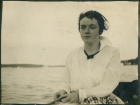
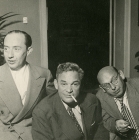
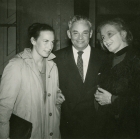

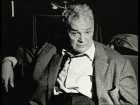

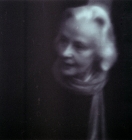
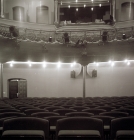
Credits
Kortner
Passion and Idiosyncrasy
With Marianne Brün, Klaus Maria Brandauer, Rolf Boysen, Thomas Holtzmann, Ivan Nagel, Doris Schade, Otto Schenk, Gisela Stein and Peter Stein
Produced by Andreas Lewin Filmproduktion for Südwestrundfunk and Rundfunk Berlin Brandenburg
2004
60 min
Digi-Beta
Director of Photography Wojciech Szepel
Sound Jan Weymann
Editor Sabine Brose (BFS)